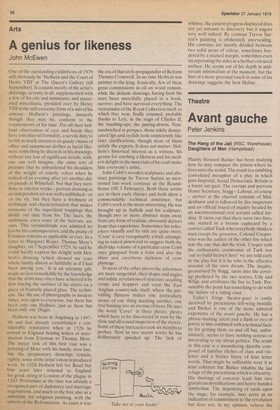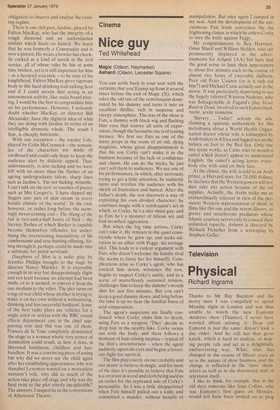Theatre
Avant gauche
Peter Jenkins
The Hang of the Jail (R SC, Warehouse) Daughters of Men (Hampstead) Plainly Howard Barker has been studying how he may compare the prison where he lives unto the world. The result is a rambling convoluted metaphor of a play in which post-Imperial, Social Democratic Britain is a burnt out gaol. The corrupt and parvenu Home Secretary, Stagg — Labour, of course — arrives at the charred remains of Middenhurst and is followed by fire inspectors and an official board of inquiry headed by an unconventional civil servant called Jardine. It turns out that there were two fires, one started in a broom cupboard by a convict called Turk who everybody thinks is mad except the governor, Colonel Cooper, who was the author of the other fire which was the one that did the trick. Cooper with the enthusiastic connivance of Turk was 'out to build heaven here' we are told early in the play but it is he who is the effective arsonist of his own dream. The inquiry, pressurised by Stagg, turns into the coverup predicted by the two screws. Udy and Whip, and attributes the fire to Turk. Presumably the point has something to do with the failure of a ruling class.
Today's fringe theatre-goer is easily deceived by pretentious left-wing twaddle and Barker is one of the more admired exponents of the avant gauche. He has a phrase-making talent and a flash or two of poetry in him combined with a technical facility for getting them on and off but, unfortunately. seems to have nothing serious or interesting to say about politics. The result in this case is a meandering diatribe composed of familiar clichés of class and violence and a Sixties litany of four letter words. That might be sufferable were it at least coherent but Barker inhabits the last refuge of the pretentious which is obscurity. His shortage of concrete leads him into gratuitous mystifications and heavy-handed symbolism. The depositing of turds upon the stage. for example. may serve as an indication of commitment to the revolution but does not, in my opinion, relieve the obligation to observe and analyse the existing regime.
There is one rich part, Jardine, played by Fulton MacKay, who has the integrity of a rough diamond and an authoritarian instinct which feeds on hatred. We learn that he was formerly a Communist and is now a patriot. He wears a bowler hat cheekily cocked as a kind of snook at the civil service, all of whose rules he has at some time broken, yet it is still important for him — as a licenced eccentric — to be sure of his knighthood. Fulton MacKay gives vigorous body to this hard-drinking foul-talking Scot and if I could accept that acting is an autonomous activity, like ouija board playing, I would be the first to congratulate him on his performance. However, I seriously doubt whether MacKay, or director Bill Alexander, have the slightest idea of what they are doing with Jardine in terms of an intelligible dramatic whole. The result I fear, is cheaply histrionic.
With one exception — the warder Udy, played by Colin McCormack — the remainder of the characters are made of cardboard and could only hope to keep the audience alert by didactic appeal. That, unfortunately, is also lacking and we were left with no more than the flashes of an ageing undergraduate talent, sharp lines such as Jardine's, 'I'm not fucking Aristotle. I can't talk on the trot' or touches of poetry such as Mrs Cooper's, 'I have dipped my fingers into jars of skin cream in every hostile climate of the world.' In the end, however, or rather long before the seemingly never-coming end — The Hang of the Jail is two-and-a-half hours of bird — the literary flashes of which Barker is capable become themselves offensive for underlining the overweening insensitivity of his cumbersome and arse-busting,offering. Sitting through it. perhaps, could be made into a subtitute for penal servitude.
Daughters of Men is a radio play by Jennifer Phillips brought to the stage by director Nancy Mackler. It is enjoyable enough in its way but disappointingly slight and not least because no attempt had been made, or so it seemed, to convert it from the one medium to the other. The plot turns on a tug-of-war child whose mother is trying to make it on her own without a womanising, drinking and less successful husband. Some of the best radio plays are vehicles for a single actor or actress with the BBC sound effects department cast in the chief supporting role and this was one of them. Frances de la Tour completely dominated the stage as a woman whoge very power of domination could result, as here it does, in liberated loneliness, childless and hus bandless. It was a convincing piece of acting but why did we never see the child again after her establishing appearances. why was Annabel Leventon wasted on a motionless narrator's role, why did so much of the action take place off stage and why was the final twist to the plot utterly inexplicable? The answers, I suspect lie in the conventions of Afternoon Theatre.







































 Previous page
Previous page